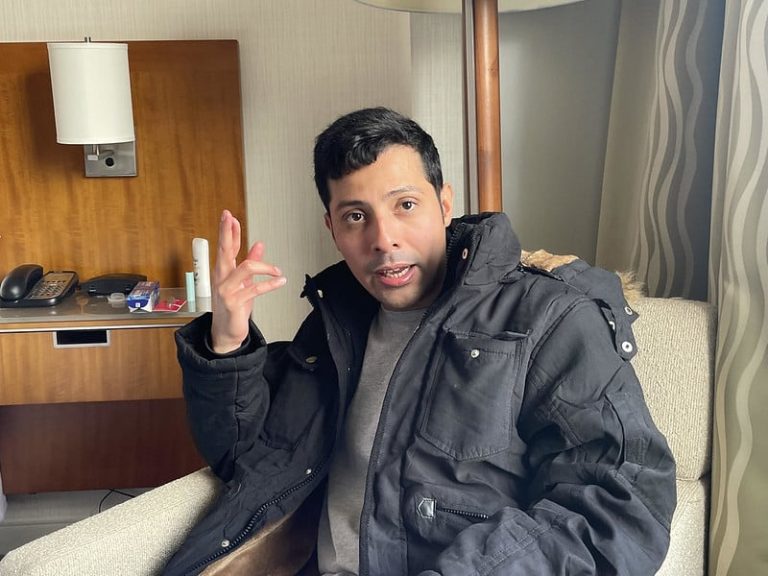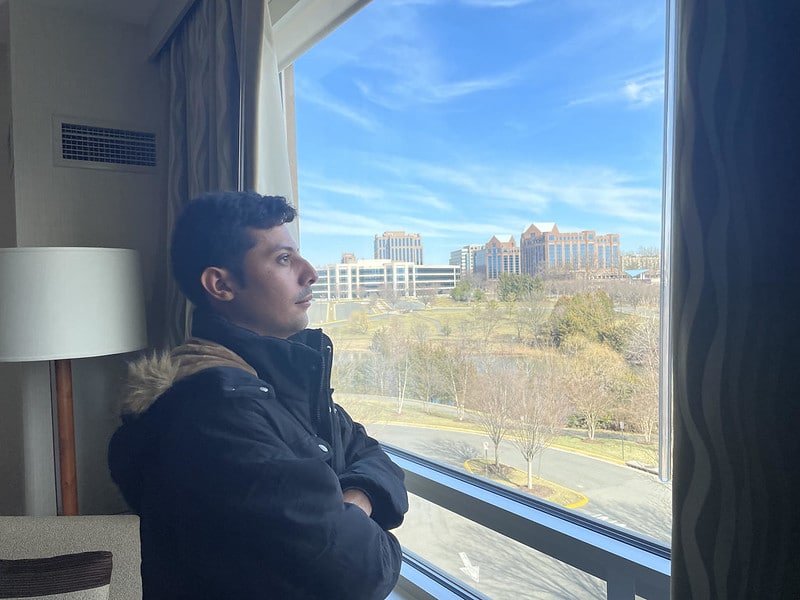19 de febrero 2023

The Cuban Regime’s Punishment for Filming a Protest

PUBLICIDAD 1M
PUBLICIDAD 4D
PUBLICIDAD 5D
The released and exiled political prisoner comments: “They weren’t able break me and I’m certain I have more to give.”

Nicaraguan Yader Parajon in his hotel room in Washington D.C. Photo: Paula Escalada / EFE
Despite a year spent locked in a punishment cell, his brother’s death during the 2018 protests, and the sadness of knowing that his father has been left alone in Nicaragua, Yader Parajon assures that his eagerness to continue the struggle remains intact. Parajon is now in the US after being released and banished from the country by Daniel Ortega, along with 221 other political prisoners.
“I know they couldn’t break me, and I’m certain I can give more,” he told the EFE news agency in an interview held in the hotel room that sheltered him during his first days in Washington.
Parajon is one of the 222 Nicaraguans who arrived in the United States on February 9, after Ortega made the abrupt unilateral decision to send a large group of political prisoners detained in the past several years on a plane to the US capital.
“We were kidnapped,” Parajon notes. He was captured by police in September 2021, after the murder of his brother during a protest led him to become a public campaigner for human rights.
Like all those who boarded that flight, Yader left behind his country and his nationality. That’s a lot, but he also left his family, something especially grievous for the young man since his father is all alone in Nicaragua, with one son killed and the other banished from his country.
It was thoughts of his father, Miguel, that helped him not sink into despair when he was locked up. “The man had already lost one son, and I had to resist, because I couldn’t leave him all alone,” Yader recalls.
Escaping “the claws”
According to promises made by the government of Joe Biden, the prisoners will be able to apply for family reunification. “They say we’ll be able to bring over close family, but I don’t know what my father would decide to do; he feels that leaving Nicaragua is abandoning his son, because that’s where the body of my brother is buried,” Yader explains.
During the interview, Yader, 32, tells how his father cried with emotion in Managua, a few hours after learning of Yader’s liberation. The tears flew when he came across the bottles of water that he would take to the El Chipote jail, for his son.
“He told me: ‘I saw your water bottles and was filled with nostalgia. I burst out crying, because I had to settle for bringing you water, so you wouldn’t lack it. The distance pains me, but I prefer for you to be far from the claws of those people.’”
Nearly five years after the burial of his older son, Jimmy – killed by a gunshot wound in the chest during the 2018 protests – and only a few days after learning that his younger son was out of jail, after 17 months of horror, Miguel Parajon is living in a dichotomy, Yader states.
He’s relieved knowing that Yader is safe, but sad he won’t see him again; he’s haunted by fears of possible reprisals against him, but content that his son has escaped “the claws.”

Nicaraguan Yader Parajon gazes out the window of his Washington D.C. hotel room. Photo: Paula Escalada / EFE
During the interview, Yader Parajon sported a colorful tracksuit with a rainbow flag, a symbol of his sexual diversity, he says. It bears the revealing phrase: “I wish you were here.” I bought it in a supermarket with the $300 they gave us when we arrived, together with some clothes and a telephone.” The latter never stops ringing.
The cheerful clothing is his attempt to disguise all the crying he’s done these past few days. “I’m very tired and worn out, physically and spiritually. Right now, I feel like I’m out under the open sky, but I don’t know how it will go for me, because here you have to start again from zero,” he reflects.
He’s safeguarding in his room the clothes he came in: “A pair of super-narrow black pants and a green t-shirt with a bow on the stomach.” Those are the clothes his father brought him on his last visit to the prison.
“I was the only fashionista on that flight,” the young man jokes. Yader was studying psychology at Nicaragua’s Central American University in 2018, when he began to get involved in the student protests, sick and tired of looking around him and feeling strangled, without a future.
He harbors no bitterness and will return to the struggle
He was just one more among the thousands who marched in 2018, but he became completely absorbed in the protests after May 11, 2018, the day that a bullet to the chest killed his older brother, Jimmy Parajon, while participating in the occupation of a university. “I didn’t want my brother’s blood to go unpunished,” Yader says.
Yader Parejon then became one of the most public faces of the Mothers’ of April Association, and he toured South America with the Caravan for International Solidarity with Nicaragua.
Upon his return, his personal hell began. A constant police guard was mounted at the doors to his house. Because of this, he decided to leave secretly and emigrate.
However, he was detained at the Honduran border in September 2021. They took him to the El Chipote jail in Managua, where he spent an entire year, locked with one other prisoner “in a two-meter by two-meter punishment cell, the size of that piece of furniture,” he says, pointing to a closet in the hotel room.
Despite all that, he declares that he holds no bitterness, and when his period of “grieving” ends, he’ll go back to the struggle. “When my country demands of me a public service, I’ll be there, honoring the memory of my brother.”
Summing up his overall feeling during these recent days in the hotel, the best description, he says, is “hopeful.” “There’s a lot of eagerness to continue struggling, wanting to see that free Nicaragua that can place its bets on a true and stable democracy. Those of us who believe in that, aren’t going to give up.”
This article was originally published in Spanish in Confidencial and translated by Havana Times
PUBLICIDAD 3M
Agencia de noticias internacional con sede en Madrid, España. Fundada en Burgos durante la guerra civil española en enero de 1939.
PUBLICIDAD 3D